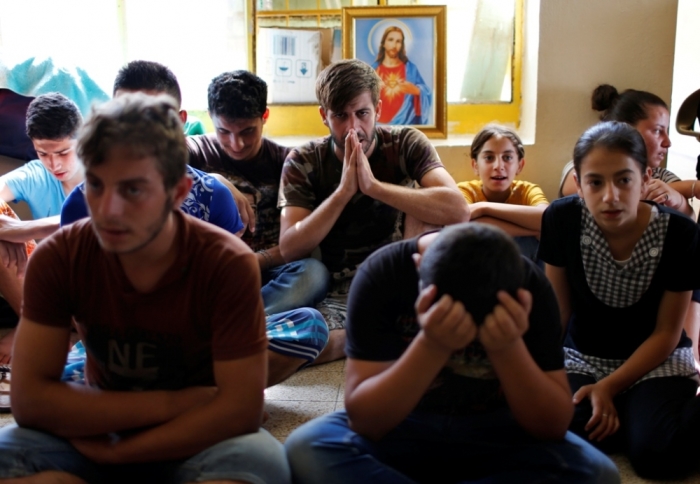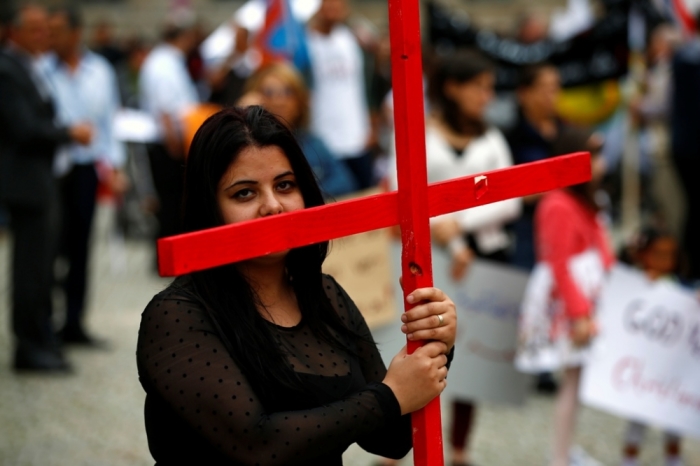Christians Urged to Gather on International Day of Prayer as Persecution Reaches Unprecedented Levels

Christians are being urged to come together on the International Day of Prayer for the persecuted church on Sunday, with persecution watchdog group Open Doors noting that hostilities against believers this year have reached unprecedented levels in modern times.
Open Doors CEO and president David Curry told The Christian Post on Wednesday that his organization is hosting live webcasts on both Saturday and Sunday, where people can interact and pray with persecuted believers, and listen to expert commentary on the crisis.
He said that the rising tide of violence against Christians has reached unprecedented levels for modern times, particularly with the rise of terror group ISIS in Iraq and Syria, but also in the continued persecution and denial of freedom for followers of Christ in oppressive regimes like Saudi Arabia.
Below is an edited version of Curry's interview with CP:
CP: What is the importance of the International Day of Prayer for the persecuted church, and what will the webcasts offer?
Curry: I think it's important considering all that has happened in the last year, from Iraq to Syria, to the issues of persecution in North Korea; that we have a time here in America to come together and pray as one body of believers for the people who are part of our family, who are persecuted. And so we are organizing the International Day of Prayer this weekend, and we are having a simulcast event where people can take part and pray, interview and talk with persecuted believers, just to rally our family around this idea that we want everybody to have the freedom to study the words of Jesus and decide for themselves if He really said who He said that He was.
We have two simulcasts — for anyone who wants on Saturday, at 5 p.m. PT (8 p.m. EST), people can come in and hear from persecuted believers. There's going to be stories, we're going to interact on Facebook and Twitter, where people can ask questions. We'll have a man from Iran who's been imprisoned for his faith, tortured for his faith — he's going to be there answering questions. It's just going to be an interactive time to pray with persecuted believers, and have them pray for us.
And then on Sunday, on the actual day for the persecuted church, we'll have prayer and interviews with persecuted believers at 4 p.m. PT (7 p.m. EST) — just for one hour on Sunday to share, and come together as the body of Christ.

CP: Christian persecution has been at a heightened stage for years, but with the rise of terror group ISIS, would it be fair to say that 2014 has reached unprecedented levels?
Curry: I think in modern times certainly, this is unprecedented. I think it's just the tip of the iceberg. People need to understand that persecution of Christians is not episodic, it's ongoing, and the pressure is building. So while we may hear it on episodes — when someone is beheaded, when one town or another is overrun by jihadists rebels — we hear about that, but it's happening every day.
Also in countries where there aren't any violent episodes, but there's a lack of freedom of expression. [Like] in Saudi Arabia, where no one hears about many acts of violence, but the control of the government, in its ability to make Bibles illegal, to make it difficult for people to get a Bible, to attend church, to decide for themselves that they are going to convert — that control is so massive, and people need to know what happens.
So yes, the [persecution] is growing, and it's unprecedented in modern times, certainly.
CP: In June, Open Doors published a list of countries where Christians face the most violent attacks for their faith, and Nigeria topped that list. With the rise of ISIS and the type of global threat that it represents, is it getting harder to narrow down such lists?
Curry: As of June when we printed that most violent list, Nigeria certainly was there because of Boko Haram, which uses very violent methods and was able to attack entire villages with machetes and guns. Christian villages where people were trying to live in peace were surrounded by Muslim extremists.
All of our lists are done on extensive research, and at the end of the year we will recompile to see which countries are the most violent toward Christians. It is certainly going to be that Iraq and Syria, concerning what has happened with the Islamic State, are going to be right up there at the top.
CP: How troubling are reports and rumors that Boko Haram, ISIS, and other extremist groups that persecute Christians could be starting to cooperate with each other?
Curry: Actually, I think that there has been cooperation already. Maybe we are finding out about it [now], but I definitely think you have groups that have all spun off from al-Qaeda, who have shared resources, who have worked in concert using the same types of methods.
So I do think this is a concentrated effort, and it's not anything different from what has happened before. I do think that in the Islamic State you have a group that is organized, that has a stronger leadership, you might say, and so it's natural that Boko Haram will try to attach to them and benefit from what is going on.
CP: With Islamic extremists targeting various religious minorities, as well as Christians across denominations, have you heard of a rallying call for unity in the midst of all this persecution?
Curry: I think one of the developments of persecution is definitely that. Denominations and divisions of Christian faith fall apart, because we pull together as one. That's what we want to see, but unfortunately it doesn't happen often enough here in the West. We need to see each other as brothers and sisters, all with different faith expressions perhaps, but we are one body, and we need to pull together as such.
The One With Them website offers further details about the International Day of Prayer 2014, including how people can sign up and watch the webcasts on Saturday and Sunday for free.





























